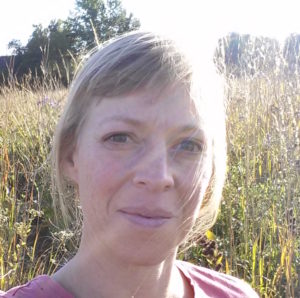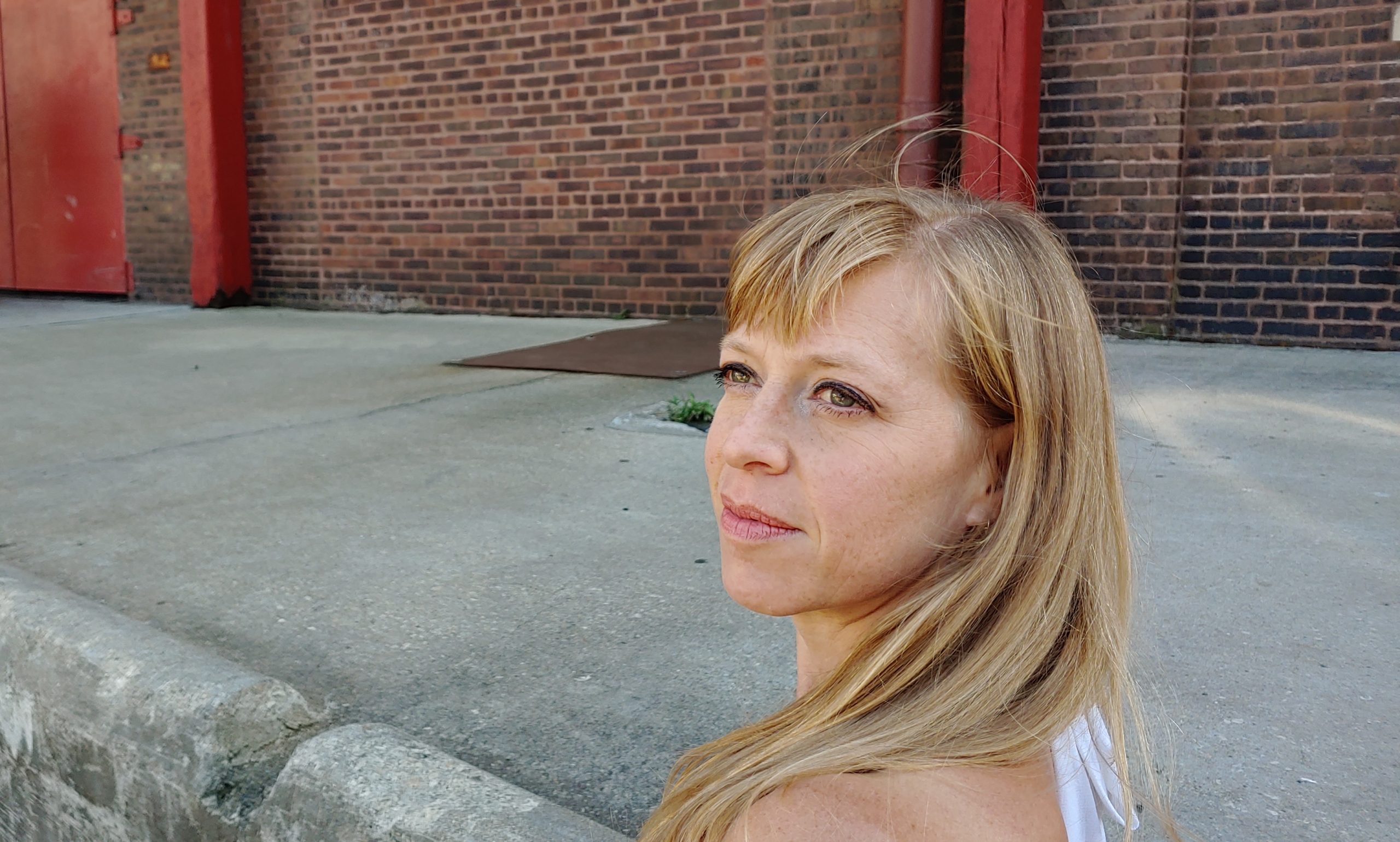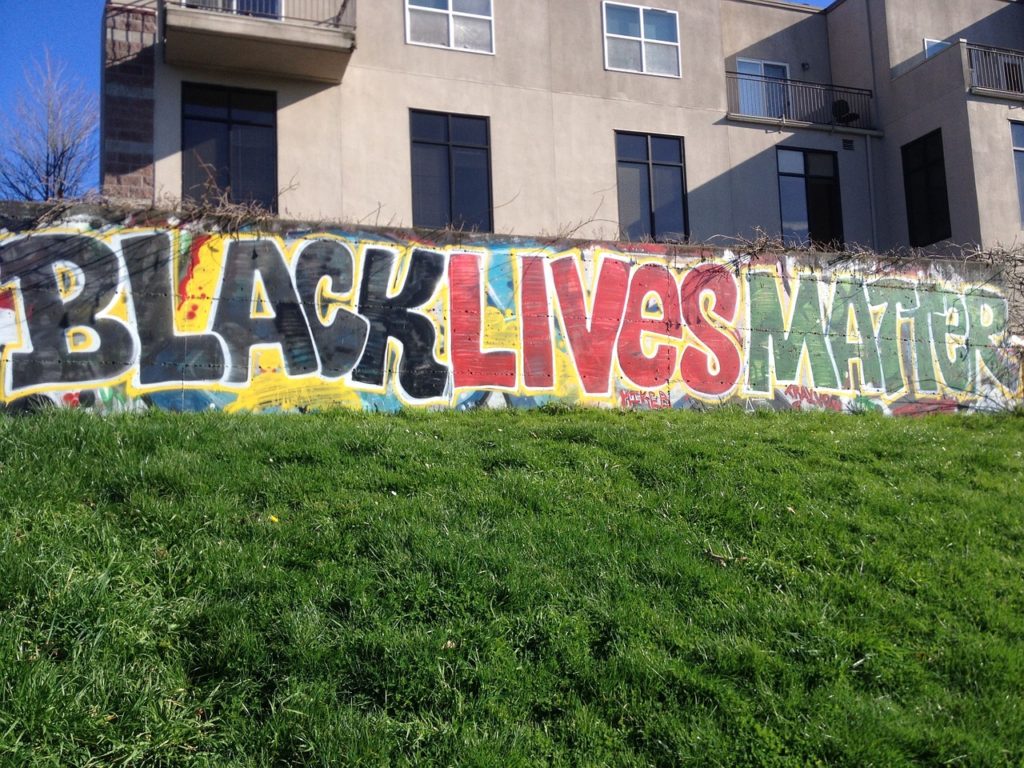I was listening to a Dave Chang podcast episode a couple of weeks ago called How Asian Americans Can Better Support Black Lives Matter. He discussed how and why Asian Americans should fight against the antiquated model minority notion, advocate for this movement against centuries-long systemic racism and police brutality and be a good human. But to me, it is a given that we show our support. We are already familiar with what inequality and injustice look like – and we understand how complicity by those reaping the benefits of their lucky social construct is an evil in itself.
Interestingly and awesomely, the protests have been color agnostic this time around. The footage plastered on the news and social media weren’t only illustrative of Blacks, LatinX, Asians and Muslims – those fighting for the cause because they understand oppression and horrifying murders – but humans of all ethnicities, ages and gender. Many white citizens also showed their love and support.
My real inquiry is this, however: Once the news turns off, and the hype of the protests subsides, then what? Do those who aren’t generally accustomed to fighting for the underdog go back to their normal lives? How can white people remain an active voice in this movement and get their hands dirty? Plain and simple – what should white people do?
WHAT SHOULD WHITE PEOPLE DO?
I didn’t know how to find the answers myself — what resources to read, what terms to google. So I decided to ask my friends. This post will be a three-part series with three different points of view. I will ask them overlapping questions.
In Part I, I interview my dear friend Kaara Kallen, a white Jewish woman from Chicago who does freelance editing and teaches at Northwestern University. She is highly educated with a BA from UC Berkeley (with honors) and a Masters from San Francisco State University. She is the daughter of an attorney father and psychologist mother.
In Part II, I will reveal the words of my friend, Mason Williams, a Black man from Los Angeles who has been directly impacted by years of prejudice, inequity and unwarranted questioning, at the hands of racism.
And Part III will be an interview with Mary Morello, a white 97-year-old former school teacher from Libertyville, IL, an activist and mother of Kenyan American musician and political activist, Tom Morello.
What does a white woman know about what white people need to do on behalf of Black people?
It’s a rhetorical question — but I wanted to interview Kaara since as long as I have known her. She understood her privilege and sought out to understand the people. Throughout college, she was a Big Sister for Big Brothers Big Sisters– and always proactively studied history and anthropology to better grasp the day’s social and political climate. These days, her freelance work is centered around clients committed to access and equity. She has always been a loud political voice – never complicit to injustice. I was curious about her vantage point and her take on what should white people do.
THE INTERVIEW
Kaara, thank you for doing this interview.
Black people have been stolen, raped – and then they had the land they created and shed blood, sweat and tears for – stripped from them. The Constitution was historically built on sustaining the white hierarchy.
So now – when we are emerging on this next Civil Rights Movement or perhaps a Revolution – what can we do? How can non-Blacks, and whites in particular, not be complicit in the proliferation of evil?
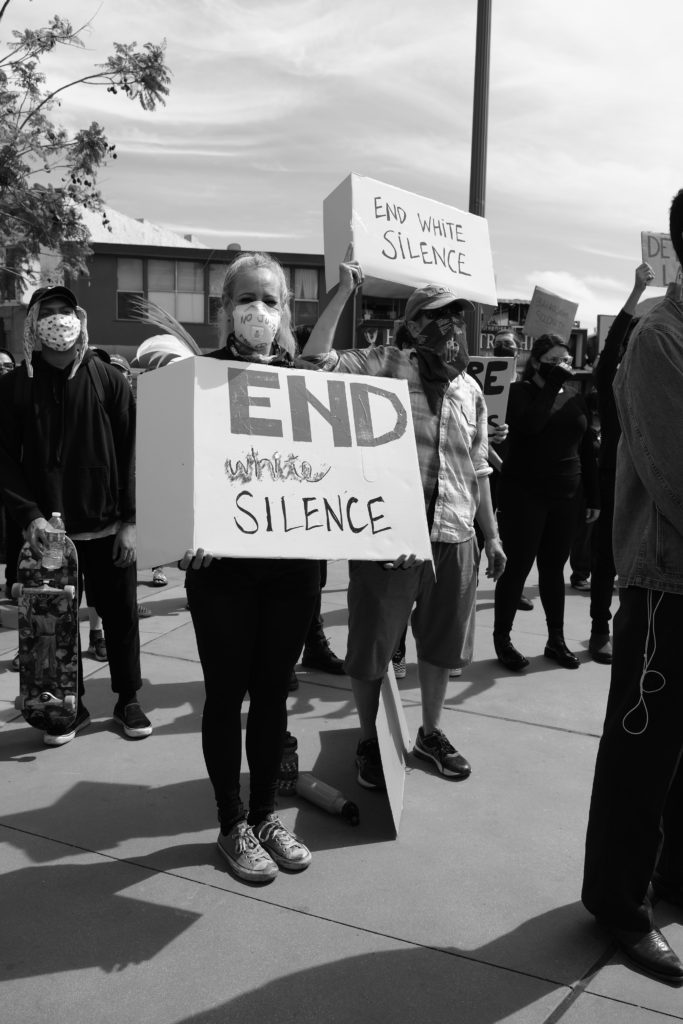
Nice white people holding signs in peaceful protests can be complicit too. How do we get out of it? How can we, as a nation of white people, proactively jolt the paradigm shift?
I think white people are much more reluctant than they realize to give up what they need to give up in order to clear the space for something resembling equity. The privilege of not having to think about race all the time, for one thing. What I mean is, I’ve been thinking about race almost constantly since George Floyd’s murder and I’m friggin exhausted and overwhelmed. It’s been three weeks. Black people have to do it nearly every day of their lives.
What else do white people need to give up?
Well, in most places, access to better everything. Better schools. Better children’s services. Access to power in the workplace. Being believed at the doctor. Absence of police presence most of the time, except on the rare occasions when they are helping us. Greener, safer, quieter streets. I’m not saying white people *shouldn’t* have those things. They should. But I’m saying *everybody* should have those things.
The problem is, generally white people have things because someone else doesn’t. Choices are made as to where to allocate funds, political will, and public trust. If white people truly want a paradigm shift to equity, they need to demand of governmental entities and businesses and neighbors that high-quality things go to everyone and go there at no community’s expense.
So that’s not comfortable, because it feels like you can lose those things if you are willing to put them on the table to share. And damn, it’s also not easy in a country where “I got mine and I got it all by myself” is a powerful doctrine.
If you are white, it is so easy to not-see how steeped in privilege you are. It is so, so easy to sort of slip that cloak of privilege on and off as needed—it is so easy, and comes so naturally by the time you’re an adult, that you hardly even notice you are doing it.
And it is very difficult even for those with the best intentions – to envision a world without that privilege, which embraces you so closely that you don’t even know there are other ways the world could be. And how can you fight for something that you can’t envision?
How has race shaped your life? I know you attended a high school that had a large population of Black students. What overt racism did you witness and how did that shape your experience?
My high school was I think something like 40% Black, 50% White, and like 7% Latino. Even at the time I attended, I knew it was messed up that with rare exceptions. All the kids in my AP classes were white. It weirded me out that many activities and clubs were the domain of mostly white kids or mostly Black kids. And that my friends were almost exclusively white. I graduated thinking mine was the most racist community in the world. That said, when I got to college I realized that I had been chewing on difficult and uncomfortable issues of race and racism for years that many of my dorm mates hadn’t necessarily thought about yet.
So I grew up quite aware of racial inequities and social justice imperatives, and just as aware of how hard my community was failing at addressing those things. But it did take me a while to understand my own complicity. I was raised in well-meaning white progressive racism—everyone wringing their hands and trying things around the edge, nothing really changing and no hard introspection of oneself. At that time, in the late ’80s and early ’90s, my town had been fighting issues with academic tracking and segregation and policing practices and such since at least the 1970s.
And you know what? They are still fighting them in 2020.
Now, a lot of people in my home town had and have authentic, strong interracial friendships. My hometown community had among the largest percentage of Black homeownership in the country at the time I lived there. (I think it’s gotten whiter since then.) In my experience the kids I went to school with grew up to be incredibly thoughtful, engaged, socially active people. In fact, a lot of them are doing truly amazing things for equity and justice. There are a lot of wonderful things about my high school that I am really grateful for. But, as with everywhere else, it’s time to change approaches drastically, with the goal of finally changing outcomes.
My response to racial and other injustices has been to do my best to educate myself, to do political and social advocacy, to seek equitable practices in my life, to give money and to pay attention to where I spend it, to set about intentionally raising my daughter with our priorities of equity, access, and justice.
Not all racists are insidious racists – wearing cones and waving confederate flags. How do you spot covert racism in the different institutions of America? Have you? And what is your reaction emotionally and do you vocalize it through words or action?
Oh, boy, How do you spot covert racism in institutions in America? Spot an institution. You’ve done it! You are looking at covert (or overt) racism.
When you learn about the incredible amount of energy and hate put into destroying the lives and communities of Black people even after slavery, even after Jim Crow, even after the Civil Rights Movement, your entire body and soul is sickened. Black people were destroyed so that white supremacy could be asserted, over and over and over. It took place differently in the South and the North, but it defines our country, still, in both places.
Did you know that in the generation or two following the Civil War TENS OF THOUSANDS of Black people seeking political office or positions of civic leadership in southern states were killed? Can you imagine not only how that terrorized Black families and communities, but altered the course of government policy and priorities? Those policies and priorities live to this day.
All over the country, throughout the decades, Black communities that set themselves up for dignity and peace were methodically starved of economic, political, educational, and civic resources; sometimes they were terrorized and burned to the ground. The legacy of those policies, sometimes extralegal but sometimes absolutely established and supported by legal and civic entities, is central to the inequities we see today.
Toxic dumps and industrial pollutants are overwhelmingly more frequently placed in communities of color. Green spaces are overwhelmingly less frequently so. Prisons and prison policies were built explicitly as replacements for enslavement. Policing structures date back to anti-slave patrols.
So back to your question—the foundations, floors, walls, and roofs of our institutions are made up of white supremacy, and we have historically gone to ghastly means to maintain those.
Thinking back – can you see if you or your friends were ever unintentionally racist? Is it evident now, looking retroactively, how this could be harmful?
Oh my gosh, of course. I think about it all the time. I still do racist things—unintentional, but the outcome is far more important than intent. If you are white in America, you are steeped in racist perceptions and behavior, period, and you have acted racist and thought racist things. In order to practice anti-racism, it is necessary to first admit that denying the racism within yourself is denying the very foundation from which the work must start. And denying racism also means you are privileging your comfort over others’ oppression. It is the work of white people to practice anti-racism—and to understand that they will make mistakes and probably have a long way to go in the process.
[adsenseyu5]
We can’t do this overnight, but what can white people do now? What can a nation that favors rich, educated, white people do to fight for justice and equality?
Read about the anti-racist practice and do the work within yourself.
And don’t stop doing that. And do it on your own or with other white people; don’t ask people of color to educate you. Showing Up for Racial Justice (SURJ) has some incredible tools, such as webinars and guides for educating yourself and other white people in your orbit. This Google Doc has also been making the rounds for good reason.
Talk to the white people around you—family, friends—about racism and anti-racism and about our country’s history and legacy.
For me, this is really really really really really hard. I’ve gotten nowhere with this task.
VOTE.
Not just for the president. Not just every four years. In EVERY election, and ESPECIALLY for the down-ballot local races. Those unsexy little local races are where our country gets made and unmade.
And be an EDUCATED voter.
Know who and what you’re voting for. If the task seems overwhelming, pay attention to endorsements by organizations you respect. And don’t just vote.
Get others to vote.
Support Black businesses and give money to Black community organizations.
There are all kinds of lists going around now on social media for companies and organizations in my city — I bet there is for yours, too.
Hiring? Look into HBCUs and Black professional organizations.
Don’t make people come to you. Go to them.
Do show up.
Yes, marching isn’t enough, but it’s part. Show up too at city council meetings, school board meetings, community organizations, and so on. Your white voice carries privilege. Use it.
You are not a great white hope.
Listen carefully to people of color about what is needed. Do more listening than talking. Follow the lead of the people and organizations on the front lines. Be an ally – support people in their expertise.
Ask businesses and organizations that you have a stake in — you work there, you are a member, you’re on their email list — what specific steps they are taking toward anti-racist practice.
At school board meetings and such, fight for everyone’s kids, not just yours. Remember the notion of a larger pool of stakeholders: if you fight for justice and equity, your kids will benefit. If you fight for your kids’ comfort, they may achieve some, at the expense of others—and it will require protecting.
-
-
“I don’t see color” has allowed white America to look the other way while Black people continue to be treated like garbage, yes. This guy needs a lesson in structural racism. It’s easy to say you treat everyone as an equal when you can’t or won’t see that the world that brings you success and comfort is built on the systematic exploitation of others.
-
I was at a School Board meeting and we were meeting with the DEI department. One man – who doesn’t hold nefarious intentions naively said that racism doesn’t exist anymore and he sees everyone as an equal. He was jumped on by 90% of the people in that room. Is it his responsibility to see that racism still prevails and do you think his response was the response of the privileged? Is his viewpoint dangerous?
Yes, yes, and, as “I don’t see color” has allowed white America to look the other way while Black people continue to be treated like garbage, yes. This guy needs a lesson in structural racism. It’s easy to say you treat everyone as an equal when you can’t or won’t see that the world that brings you success and comfort is built on the systematic exploitation of others.
I’ll add that the fact that institutions have a DEI department and it’s not just part of their foundational understanding is indicative of the problem. Don’t get me wrong, it’s better to have one than not, I’m not trashing your school.
But in my mind, DEI initiatives as separate from the rest of functioning should have been a temporary transitional step to the full understanding and equity in, like the 70s. Or 80s. Or 90s. or 00s. or 10s. That we still have them tells me that white America has refused to allow itself to change meaningfully.
Are we about to embark on a revolution – or are the American people going to lose interest if we don’t act fast.
What do we need to do at the government level? What about in the home?
How do you plan on educating your daughter?
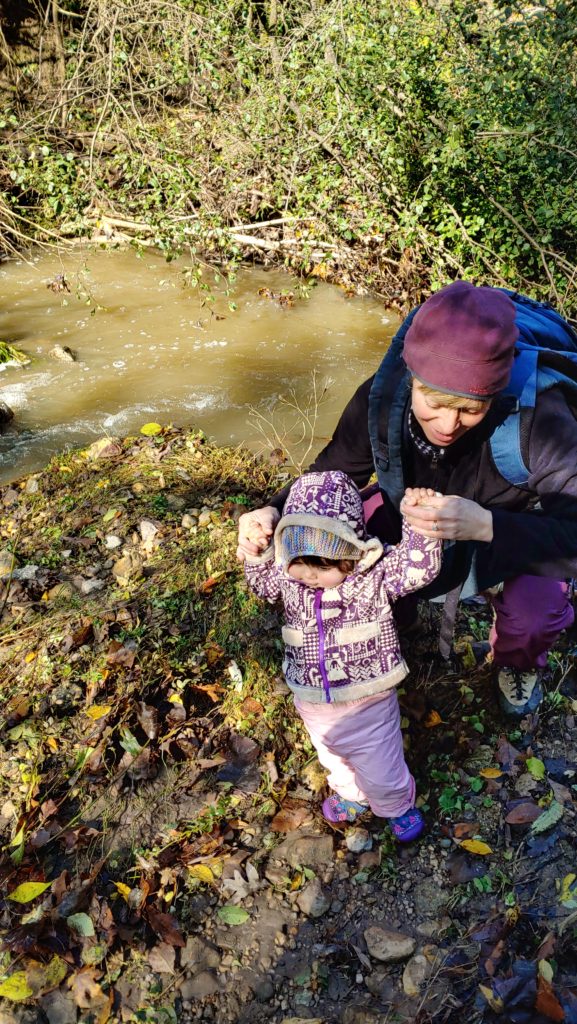
Should Colin Kaepernick be nominated for a Nobel Peace Prize?
I am so grateful to him for his moral clarity and his leadership. A lot of people are feeling pretty stupid right about now.
[adsenseyu1][adsenseyu2]
++ Kaara Kallen is a content consultant for people in educational, for-purpose, and creative fields, and a university instructor. She recently co-piloted a sustainability-focused design thinking course. She is interested in restoring and nurturing natural and human ecosystems.
